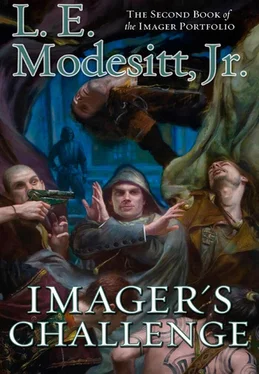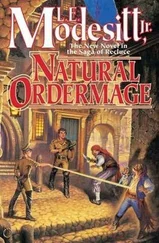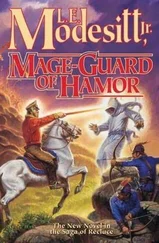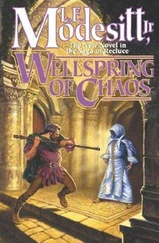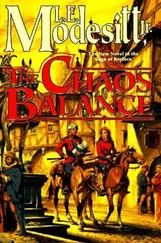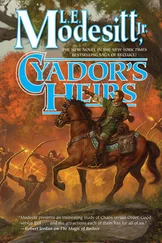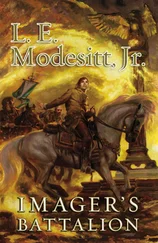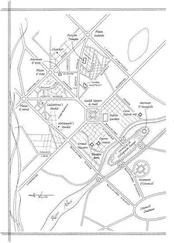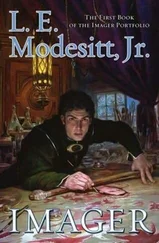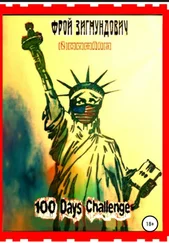L. Modesitt - Imager's challenge
Здесь есть возможность читать онлайн «L. Modesitt - Imager's challenge» весь текст электронной книги совершенно бесплатно (целиком полную версию без сокращений). В некоторых случаях можно слушать аудио, скачать через торрент в формате fb2 и присутствует краткое содержание. Жанр: Фэнтези, на английском языке. Описание произведения, (предисловие) а так же отзывы посетителей доступны на портале библиотеки ЛибКат.
- Название:Imager's challenge
- Автор:
- Жанр:
- Год:неизвестен
- ISBN:нет данных
- Рейтинг книги:3 / 5. Голосов: 1
-
Избранное:Добавить в избранное
- Отзывы:
-
Ваша оценка:
- 60
- 1
- 2
- 3
- 4
- 5
Imager's challenge: краткое содержание, описание и аннотация
Предлагаем к чтению аннотацию, описание, краткое содержание или предисловие (зависит от того, что написал сам автор книги «Imager's challenge»). Если вы не нашли необходимую информацию о книге — напишите в комментариях, мы постараемся отыскать её.
Imager's challenge — читать онлайн бесплатно полную книгу (весь текст) целиком
Ниже представлен текст книги, разбитый по страницам. Система сохранения места последней прочитанной страницы, позволяет с удобством читать онлайн бесплатно книгу «Imager's challenge», без необходимости каждый раз заново искать на чём Вы остановились. Поставьте закладку, и сможете в любой момент перейти на страницу, на которой закончили чтение.
Интервал:
Закладка:
That didn’t help the way I felt.
Finally, it was time to leave for the anomen. I took my place next to Charlsyn on the driver’s seat so that the others wouldn’t be that crowded inside the coach. Given the comparative warmth of the day, with the slight overcast, I was doubtless more comfortable beside Charlsyn than I would have been inside the coach.
The ride to the Anomen D’Este wasn’t that long, only about a quint, and we arrived early enough that Charlsyn had no trouble drawing the brass-trimmed brown coach along the east side of the building, on Elsyor. Once I helped Mother and Remaya out of the coach, I took a few moments to see if Seliora happened to be in any of the coaches that had just stopped to leave those coming to the service. She wasn’t. So I hurried up the steps into the anomen.
There were already close to fifty people there, gathered near the front below the chorister’s pulpit. I caught sight of Culthyn, Khethila, and Father in the east side corridor, set off by columns, that flanked the main hall. Khethila’s dark green mourning scarf had slipped off her hair and lay across her shoulders.
“Mother? Remaya?”
“They’ll be back in a moment,” Khethila replied. “They’re fine.”
I nodded. “I’m going back near the doors to wait for Seliora.”
“You didn’t say she was coming,” Culthyn said.
I hadn’t, I realized. I just thought it would have been obvious. “I’m sorry. She wanted to come.”
“I’m glad she is,” Khethila said.
Even Father nodded to that.
I walked back toward the entrance, then waited several yards inside the open brass-bound double doors of the anomen, back far enough that people would not immediately walk up to me.
Donalt, a distant cousin of Father’s I’d met only a few times, hobbled up the stone steps, accompanied by a younger woman who might have been his daughter. Neither even glanced at me as they walked toward the front of the anomen. A handful of others, some of whose faces I recognized vaguely, followed.
Then I could see a coach pull up, and Seliora alighted, by herself, and hurried up the steps. As she neared, I could see she wore gray, with but the faintest touch of green piping on the jacket sleeves and lapels, and a dark green mourning scarf.
I stepped forward and down the steps to meet her. “I was watching for you. I thought Odelia . . .”
“It’s better this way.” She glanced back over her shoulder. “We’d better go inside.”
I didn’t question her, but I did make sure that my shields covered her as we walked back up the steps and toward the front of the anomen. Remaya, Mother, Father, Khethila, and Culthyn were standing at the front of those waiting for the service to begin.
Mother glanced back at us, then nodded to Seliora. So did Khethila. Remaya did not turn, nor did Father.
Shortly, Chorister Aknotyn stepped up to the pulpit. “We are gathered here together this afternoon in the spirit of the Nameless, in affirmation of the quest for goodness and mercy in all that we do, and in celebration of the life of Rousel D’Factorius.”
The opening hymn was “The Glory of the Nameless.” I sang, but as quietly as possible. I noticed that Seliora wasn’t singing any louder, although she sounded more in tune than I did.
Then came the confession, for without confession there could be no understanding and no healing. At least, that was what I’d always been taught. In a way, I agreed, although I couldn’t have said why, especially since I wasn’t even certain I believed in the Nameless.
“We do not name You, for naming is a presumption, and we would not presume upon the creator of all that was, is, and will be. We do not pray to You, nor ask favors or recognition from You, for requesting such asks You to favor us over others who are also Your creations. Rather we confess that we always risk the sins of pride and presumption and that the very names we bear symbolize those sins, for we too often strive to arrogate our names and ourselves above others, to insist that our petty plans and arid achievements have meaning beyond those whom we love or over whom we have influence and power. Let us never forget that we are less than nothing against Your nameless magnificence and that all that we are is a gift to be cherished and treasured, and that we must also respect and cherish the gifts of others, in celebration of You who cannot be named or known, only respected and worshipped.”
“In peace and harmony,” came the response.
After that came the charge from Aknotyn. “Life is a gift from the Nameless, for from the glory of the Nameless do we come; through the glory of the Nameless do we live, and to that glory do we return. Our lives can only reflect and enhance that glory, as did that of Rousel, whom we honor, whom we remember, and who will live forever in our hearts and in the glory of the Nameless.”
Another hymn followed-“In the Footsteps of the Nameless.”
“When we walk the narrow way of what is always right,
when we follow all the precepts that foil the Namer’s blight . . .”
I’d never been certain that following the footsteps of the Nameless led to anything, let alone to glory, or even if the Nameless had feet, let alone footsteps, but then, I’d never been convinced of the validity of theological metaphors, either. But . . . I sang, if only because the service was for Rousel.
Then Aknotyn said, “Now we will hear from Master Rhennthyl D’Image, speaking for the family.”
Seliora reached out and squeezed my hand. I didn’t realize how cold my own hands were until the warmth of hers touched mine.
I did not take the pulpit, but walked to the topmost step of the sacristy dais, where I turned and faced the less than hundred people who had come to pay their respects to the family and to Rousel. I had to clear my throat several times before I could say anything.
“Rousel was my brother. For twenty-three years he was my brother. Over the past few years he was a wool factor, and he expanded the family business by seeking new opportunities in Kherseilles. So often that is what people remember-what others did for a living. But that was only a small part of what made Rousel special. Rousel loved life. Sometimes, when we were young, he loved it so much that chores didn’t always get done. But Rousel always understood that there would always be chores, while the joy of the moment is always fleeting and soon lost. . . .”
I went on to talk about his joys in Remaya, and in factoring, and in his son Rheityr. Somehow, I got through what I had to say and then stepped down.
Remaya was weeping, and so was Mother. I just hoped that their tears were because I’d created an image of Rousel that touched them.
Chorister Aknotyn stepped forward to the pulpit once again. “At this time, we wear gray and green, gray for the uncertainties of life, and green for its triumph, manifested every year in the coming of spring. So is it that, like nature, we come from the grayness of winter and uncertainty into life which unfolds in uncertainty, alternating between gray and green, and in the end return to the life and glory of the Nameless. In that spirit, let us offer thanks for the spirit and the life of Rousel,” intoned Chorister Aknotyn, “and let us remember him as a child, a youth, a man, a husband, and a father, not merely as a name, but as a living breathing person whose spirit touched many . . .”
At that moment, an image flashed before me-clear, instant, and then gone-of an angular figure with a rifle looking at the main doors of the Anomen D’Este.
“. . . let us set aside the gloom of mourning, and from this day forth, recall the glory of Rousel’s life and the warmth and joy he has left with us . . .”
With those words, all the women let the mourning scarves slip from their hair.
Читать дальшеИнтервал:
Закладка:
Похожие книги на «Imager's challenge»
Представляем Вашему вниманию похожие книги на «Imager's challenge» списком для выбора. Мы отобрали схожую по названию и смыслу литературу в надежде предоставить читателям больше вариантов отыскать новые, интересные, ещё непрочитанные произведения.
Обсуждение, отзывы о книге «Imager's challenge» и просто собственные мнения читателей. Оставьте ваши комментарии, напишите, что Вы думаете о произведении, его смысле или главных героях. Укажите что конкретно понравилось, а что нет, и почему Вы так считаете.
